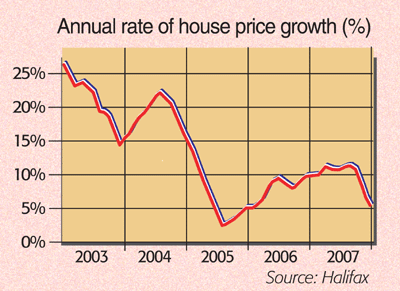Prepare for negative equity and repossessions
2008 is going to be a very bad year for the housing market. First-time buyers will find it harder than ever to get on the ladder, but it's the homeowners perched precariously on its lowest rungs who should worry most.

Get the latest financial news, insights and expert analysis from our award-winning MoneyWeek team, to help you understand what really matters when it comes to your finances.
You are now subscribed
Your newsletter sign-up was successful
Want to add more newsletters?

Twice daily
MoneyWeek
Get the latest financial news, insights and expert analysis from our award-winning MoneyWeek team, to help you understand what really matters when it comes to your finances.

Four times a week
Look After My Bills
Sign up to our free money-saving newsletter, filled with the latest news and expert advice to help you find the best tips and deals for managing your bills. Start saving today!
There finally seems to be a general consensus that 2008 is going to be a bad year for the housing market.
Last month both Nationwide and Halifax reported that house prices had fallen in November by 0.8% and 1.3% respectively.
This followed three months of bad property news with various surveys reporting that house prices were slowing at best.
MoneyWeek
Subscribe to MoneyWeek today and get your first six magazine issues absolutely FREE

Sign up to Money Morning
Don't miss the latest investment and personal finances news, market analysis, plus money-saving tips with our free twice-daily newsletter
Don't miss the latest investment and personal finances news, market analysis, plus money-saving tips with our free twice-daily newsletter
But last week Halifax surprised even themselves by reporting that prices in December rose by 1.3%. "Who says there's a slump?" was the Daily Express headline as it dismissed crash predictions as "scaremongering". So are they right?
Of course not. Month-to-month figures are very volatile and, as history shows, when the housing market takes a turn for the worse it doesn't do so overnight. The Halifax's chief economist, Martin Ellis, warns that "this mixed pattern of monthly price rises and falls is a typical characteristic of a subdued market". It's important to take a step back and look at what has happened over a longer period.

So, since the credit crunch began in August, causing banks to tighten their lending criteria, what has happened? According to the Halifax, house prices were 1% lower in December than in July, while Nationwide shows a 0.9% rise. Average the two out and, broadly speaking, "prices have been flat since the credit crisis broke", says David Smith in The Sunday Times.
An optimist or a Daily Express headline writer might say that November marked the worst month for the slump. But that ignores what is still to come. The Bank of England's credit conditions survey, published earlier this month, forecast that mortgage availability will be tight for at least the first quarter of 2008, with most lenders drastically reining in lending. Alliance & Leicester and Britannia two of the country's biggest mortgage lenders have doubled the minimum deposit they now require from first-time buyers to 10%, "in the latest sign that banks are anticipating a downturn in house prices", says Patrick Collinson in The Guardian.
On top of this, many lenders have pulled their loan-to-value ratios back from highs of 130% to 95%. Alongside the heavy stamp duty burden (see map below), this will make it nigh-on impossible for first-time buyers to buy a home although they might not be too disappointed, given the state of the market.
Those who should be worrying are the ones already on the ladder. Homeowners who have a 100% plus mortgage deal will be hard put to find a replacement when their current term runs out, leaving them with the possibility of having to pay off at least part of the loan immediately.
And there are lots of vulnerable, overstretched people out there. In 2007, nearly one in five new mortgages was considered subprime, or was made to someone who offered no proof of income. The average mortgage arranged in November was for 3.14 times earnings, far higher than the 2.26 times seen in 1990 when the market collapsed. For first-time buyers it was even higher, with the average mortgage being 3.39 times earnings the highest on record.
So it's little wonder that the most up-to-date survey shows the market starting to tumble. The Royal Institution of Chartered Surveyors which correctly predicted the last crash said this week that house prices are falling at a pace not seen since the early 1990s. Just 1% of the chartered surveyors and estate agents questioned saw prices rise, compared to 61% reporting falls. With the decline now gathering pace, it is only a matter of time before we start seeing headlines about repossessions and negative equity making an unwelcome comeback.
Get the latest financial news, insights and expert analysis from our award-winning MoneyWeek team, to help you understand what really matters when it comes to your finances.

Ruth Jackson-Kirby is a freelance personal finance journalist with 17 years’ experience, writing about everything from savings accounts and credit cards to pensions, property and pet insurance.
-
 How a ‘great view’ from your home can boost its value by 35%
How a ‘great view’ from your home can boost its value by 35%A house that comes with a picturesque backdrop could add tens of thousands of pounds to its asking price – but how does each region compare?
-
 What is a care fees annuity and how much does it cost?
What is a care fees annuity and how much does it cost?How we will be cared for in our later years – and how much we are willing to pay for it – are conversations best had as early as possible. One option to cover the cost is a care fees annuity. We look at the pros and cons.